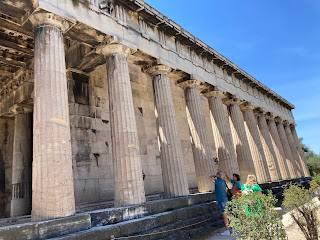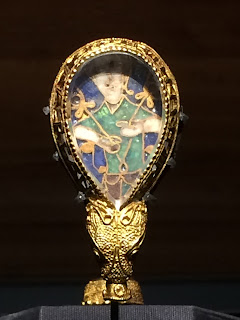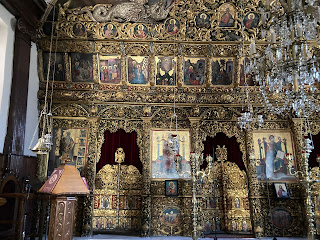To understand Greek History and lot of what we associate with "Greece" and what we saw on our trip, one has to understand the geography. In this case, Geography was very determinative in how we understand "Greece".
As a historical country, Greece (Ἑλλάς pronounced "Hellas", thus the ancient reference to the Hellenes) is a part of the Balkan Peninsula of the main European continent consisting not only of the attached land mass itself, but also of the islands of the Agean, Ionian, and Mediterranean (over 6,000 in the current Greek republic):
Another unusual feature of Greece is the fact that mainland narrows at one point to 3.9 miles/6.3 km. Known as the Corinthian Isthmus which is bounded by the Gulf of Corinth and the Saronic Gulf, this effectively separated the mainland of Greece (Attica and Boeotia) from the Peloponnesian Peninsula, thus creating a sharp divide between the two geographies (and making Corinth fabulously wealthy as a transfer point in the process).
The geography of Greece is largely mountainous (80%) with limited plains (making it, at least in that way, like Japan) with one of the most extensive coastlines in the world (11th longest); one is never too far removed from either the mountains or the sea.
All of this, of course, has impact.
To the Greeks, the sea was never seen as a barrier but rather as a highway: the first Greek civilizations of the Cyclades and Minoans were actually based on islands and the Mycenean culture used the sea for trade and invasion, as the Trojan War alludes to (and modern archaeology suggests). The sea also allowed the Greeks to colonize and expand throughout the larger Mediterranean and beyond. The Greeks became great travelers, merchants, and colonists.
Of course, being on the Mediterranean and Asian End of the Mediterranean also meant that Greece later in its history was a convenient stopping and conquest point for and all going East or West.
The mountainous terrain and relative lack of plains meant that, for the large part, small habitations (the polis) formed. We know the names of many of these small city states: Athens, Sparta, Argos, Corinth, Thebes, Elea. The nature of the land meant that for the most part farming was towards plants that could survive in dry, somewhat arid conditions for at least 50% of the year: the olive, the grape, grains.
A mountainous terrain also meant that there were several choke points to prevent travel. The pass at Thermopylae was the most famous, but there were others. Historical battles occur - and re-occur - at these choke points.
The separation between the Peloponnese and the mainland part of Greece also led to a difference in strategy in the two main powers: Athens, located along the coast and in somewhat arid conditions, turned to the sea for power projection while Sparta, deep in the heart of the Peloponnese with somewhat more plains, turned to land warfare as their power projection (and while Athens could and did field credible land armies, Sparta never really became a sea power until late in the Peloponnesian war when Persian gold allowed them to buy a navy). Also, neither side particularly developed cavalry as there were not great plains; it is to the north that we read of the horse lords of Thessaly.
Even after the Classical period, geography continued to play a role. The mountainous terrain and meant that during the Frankish and Ottoman wars, small territories could exists and hold out. The coastline meant that Venetian colonies could be supplied and reinforced, even after the mainland had been conquered.
As a small country, Greece is also very close together. It was shocking to me to realize that Athens and Sparta, the two great adversaries of the Peloponnesian War, are a mere three hours drive from each other. Corinth is about 1.5 hours drive in either direction. The distances are not nearly as vast as the writing makes them out to be.
Some pictures from driving around may help to give an idea of the countryside and geography:





















































